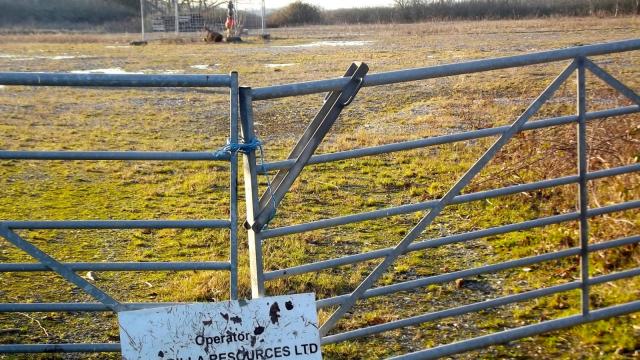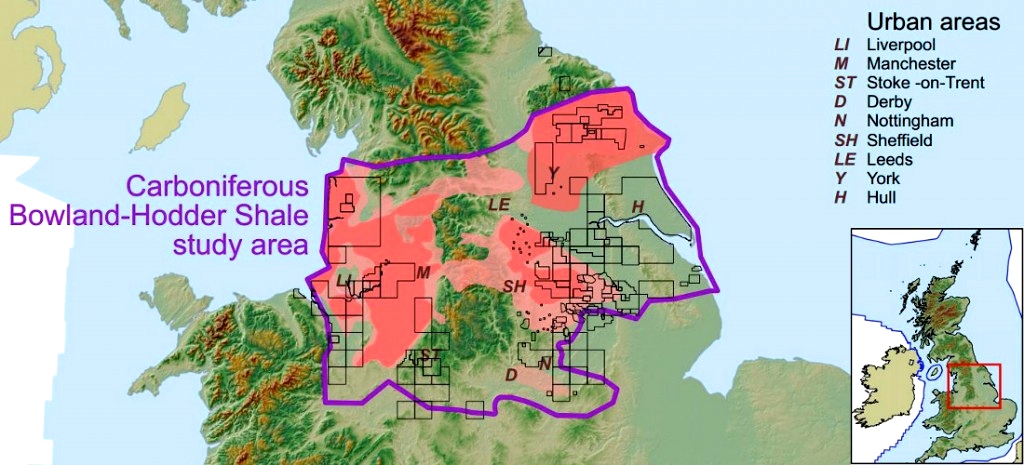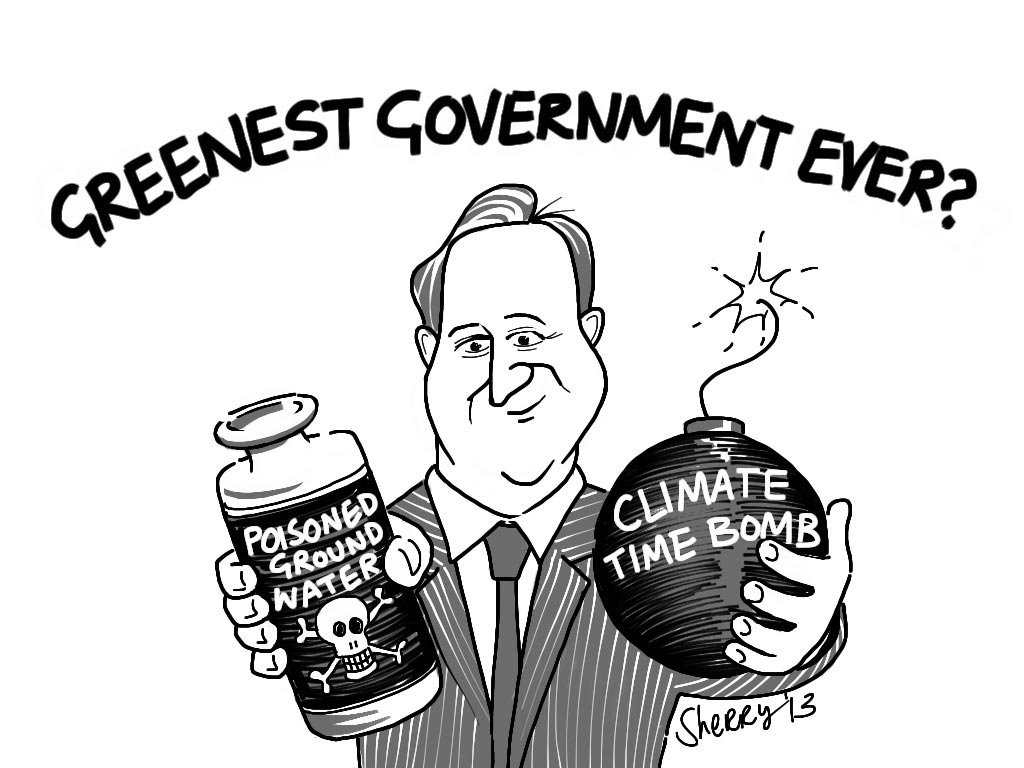
Fracking has been shown to devastate the environment and pose a severe threat to human health, according to the UN Environment Programme. The Intergovernmental Panel on Climate Change, or IPCC, asserts that shale along with other unconventional oils must stay in the ground to prevent a climate disaster.
But despite the clear and unmistakable warnings — and due to its close ties to the oil and gas industry — the U.K. government is pushing ahead. The recent U.K. Shale Gas Environmental Summit, held last week in London, was the fracking lobby's attempt to elevate the argument that it's both ecologically safe and economically wise to drill for gas through the toxic process known as hydraulic fracturing.
Protesting outside the conference, however, the group Frack Off offered one insight, among many: that the content and contributors to the so-called "Summit" reflect the way U.K. frackers are emulating the American fracking industry's approach.
How the Revolving Door is Eroding Regulation
The UN Environment Programme asserts that fracking can cause a number of serious health and ecological risks, even if it is practiced with stringent regulations. In theory, U.S. and U.K. environmental law, along with state run agencies, should be protecting their countries' ecosystems. But in America, the Energy Policy Act of 2005, known as the Halliburton Loophole, offers one of the key examples of how the U.S. fracking industry was able to sidestep these responsibilities.
At that time, then-Vice President and former Halliburton chief executive Dick Cheney requested that frackers be exempt from two key federal laws — the Clean Water Act and the Safe Drinking Water Act — that regulated groundwater pollution. Today, the strategy employed by a senior British regulator who attended last week's summit points toward a similar strategy being exercised in the U.K.
Matt George gave a presentation at the U.K. Shale Gas Environmental Summit where he explained “what operators need to demonstrate in permit applications.” George is a regulator for the Environmental Agency, a national body with responsibility to protect ecosystems. Yet his biography shows he has worked for both the agency drafting regulations for fracking, and as a consultant for the industry on how to draft applications — the job he held before returning to the state agency.
This type of private-public cocktail is similar to the senior government tax officials who have passed through the revolving door to work for corporations, assisting them in exploiting tax legislation loopholes. It has been described by a Parliamentary Committee as “poacher turned gamekeeper turned poacher.”
In Lobbying, Whoever Pays the Piper Calls the Tune
The global effort to address climate change is spearheaded by the scientific body known as the IPCC, which was born out of the Kyoto Protocol in 1997. The U.S. Senate and the George W. Bush administration failed to ratify Kyoto due to the millions of dollars paid to them in political donations from the oil industry, which told them not to do so. By not signing, the U.S. still today can ignore the IPCC stance against unconventional oils.
In contrast, the U.K. committed to the IPCC and its targets. Yet, recently the government has shifted to follow America's direction, particularly by pursuing fracking. The U.K. government's motivations were discussed by the Guardian, which highlighted theconsiderable donations made to officials by the oil and gas industry.
Furthermore, it's not only the U.K. government that supports the current fracking boom. The recent summit revealed how this stance has also been adopted by the U.K. Climate Change Council, an independent public body set up with a mandate to guide the nation towards meeting IPCC targets.
At the summit, David Kennedy, the Council's chief executive, gave a lecture entitled, “The role of shale in a low carbon economy.” The content of Kennedy's speech was revealed to Occupy.com by a conference attendee, with the guarantee of retaining their anonymity. They reported Kennedy advocated for Britain moving towards more natural gas – from fracking, renewable and carbon capture systems – to meet its power needs. The insider reflected: “He legitimized the use of fracking in Britain.”
Kennedy's apparent shift is interesting. Last year, Prime Minister David Cameron took the unusual step of blocking Kennedy's promotion to become permanent secretary for Energy and Climate. Greenpeace U.K. suggested this was because Kennedy was "too green” for Cameron — and, specifically, too anti-fracking.
Public Relations: Sowing Doubt, Buying Consent
Controversial industries have traditionally relied on public relations, or PR firms, to soften their public image — if not to spread wholesale disinformation. The U.K. research group Corporate Watch defines this brand of media manipulation as nothing less than a “threat to democracy.”
As an example, the shale summit last week drew on the global PR corporation Hill+Knowlton Strategies to explain the PR lessons it had learned representing the U.S. fracking industry. The company's managing director, Simon Whitehead, gave a talk entitled, “Getting the message right – perspectives on shale gas communications,” in which he cited his company’s primary role in an $80 million lobbying drive to sell fracking to the American public.
Famously, the same firm in the 1960s was disputing the link between smoking and cancer. Today, in addition to promoting the benefits of hydraulic fracturing, Hill+Knowlton also represents corporations extracting Canadian tar sands as well as the global biotech giant Monsanto.
It now appears that the U.K. fracking industry is taking a page out of the U.S. oil and gas playbook, by working to increase public doubt about the environmental hazards of extracting gas and oil from deeply embedded shale deposits. Greenpeace research shows that conservative U.S. billionaires quietly spent nearly $120 million on more than 100 groups with the explicit aim of creating doubt about climate change.
Like the U.S., Britain too has its climate deniers. One of them, Benny Peiser, was invited to speak at the summit. He is director of the Global Warming Foundation. The untruths spread by his group have been well documented, including a recent Guardian article that asserted the foundation “has been executing a carefully co-ordinated campaign with its media and political allies to discredit and misrepresent the findings of the IPCC.”
Corporate 'Science'
An important investment for corporations involves getting evidence to support their case — which helps explain why Big Oil on both sides of the Atlantic has in recent decades become so interested in academia. Research in America shows the extent to which Big Oil is buying into top universities, gaining controlling stakes to direct studies that benefit the industry. The report, "Big Oil goes to College," analyzed 10 industry-academia partnerships worth $830 million and their impacts.
In the U.K., there have been protests and public outrage due to a similar partnerships — like the top research university, Oxford, which teamed up earlier this year with Shell Oil to fund its Geosciences Laboratory. And a deeper look at the recent summit in London shows how even in its early stages fracking in the UK, industry is investing in science to back up its case.
The summit's chair, John Howe, is director of sustainable development for University of Central Lancashire. His biography meanwhile shows that he accepts funding from Cuadrilla – the U.K.'s main fracking company – alongside the nuclear and weapons industries. Howe's current research project centers around the political and social impacts of fracking in the northwest. It is only logical to assume, given that Cuadrilla pays his bills, that Howe won't be painting the industry's actions in a bad light.
Another suspect player, the British Geological Survey, presents itself as the “custodian of much of the country's geo-scientific information.” The U.K. government based its decision to allow exploratory drilling in 2012 based on the BGS report. At the summit, Robert Ward represented the group and gave a presentation about fracking and groundwater. Yet Frack Off research documents how the BGS is also sponsored by oil companies engaging in fracking.
The way the U.K. fracking industry has replicated the American industry represents not only how big corporations threaten the environment, but also the mechanisms they use to corrode and manipulate our so called democracy.
3 WAYS TO SHOW YOUR SUPPORT
- Log in to post comments

















